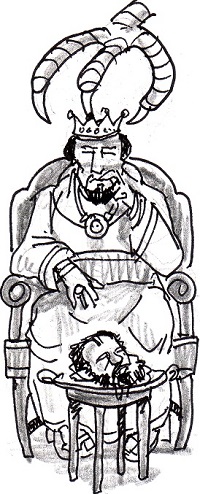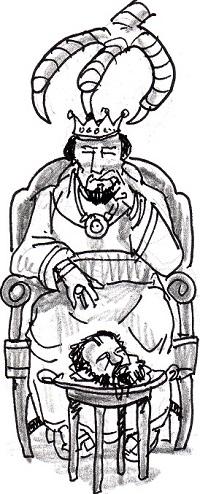

“He kept trying to see him” (Luke 9:9).
Hg 1:1-8; Luke 9:7-9
King Herod Antipas is truly one of the most tragic figures in the Gospels. He appears in a number of passages, all of them revealing him as venal, pathetic, besotted by court indulgence and easily manipulated by others or by his own superstitions and fears. He is one of four sons of Herod the Great, whose vicious paranoia prompted him to kill all the infants in Bethlehem to eliminate a potential rival his advisors warn him is a figure from God foretold in the Scriptures.
At his death, Herod’s sons each received a quarter of the kingdom, but serve as only puppet rulers under Rome. Antipas becomes a violent and corrupt ruler who covets and marries his brother’s wife, who uses her daughter to trap Herod into beheading John the Baptist at a drunken royal banquet after the girl performs a sexually provocative dance.
What makes Herod tragic is that he was intrigued to the point of respect for the Baptist, whose preaching in prison attracts him, yet he has him executed at the whim of his stepdaughter and her complicit, plotting mother. He is curious about Jesus, wondering if he isn’t John come back from the dead or one of the prophets. Today’s Gospel says that Herod Antipas “kept trying to see Jesus,” words that also describe others seeking discipleship. He is perhaps on the threshold of some kind of conversion when he finally gets his wish when Pilate sends Jesus to Herod because he is from Galilee, Herod’s jurisdiction. But when Jesus refuses to speak to him, Herod tries to save face before his court by ridiculing Jesus by wrapping a royal cape around his shoulders and sending him back to Pilate.
We can only speculate on Herod’s fate, but the Gospels depict him as another example of someone confounded by Jesus’ identity and personal appeal but is too blind and selfish to respond to the grace of conversion. Pilate is another tragic figure who overrides his conscience and condemns an innocent man to die for fear of the crowds and censure from Rome. Likewise, the scribes and Pharisees let pride blind them to the graciousness of Jesus and seek his death to protect their own authority. The Gospels present their stories to us not to let us feel superior but to confront us with the challenge of wanting to see Jesus for ourselves in order to be like him.
Advertisement






